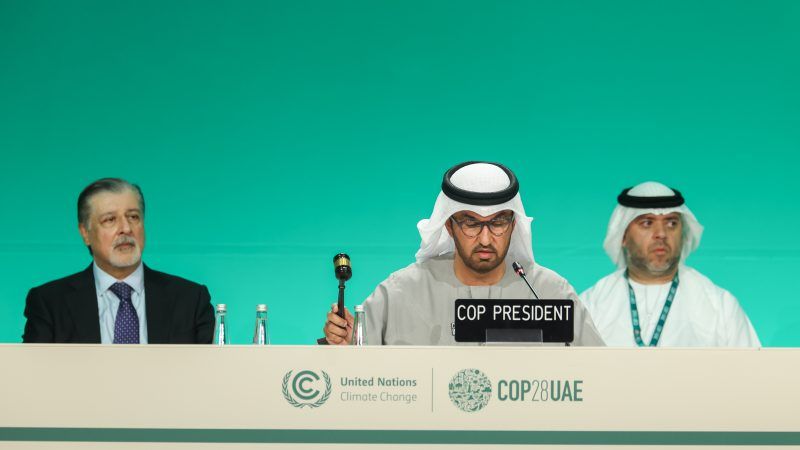No Fossil Fuel Phase-Out in COP28 Climate Deal
But perhaps the beginning of the end of era of fossil fuels?

Dubai, United Arab Emirates — "We have language on fossil fuel for the first time ever," declared COP28 President Sultan Ahmed Al Jaber as he graveled the deal reached for the Global Stocktake at U.N.'s annual climate change meeting to close a day late. Al Jaber is right. After more than 30 years of U.N. climate change negotiations since the Earth Summit in 1992, the words "fossil fuels" do appear for the first time in an officially adopted U.N. decision document. Previously, climate negotiations had focused solely on emissions without mentioning whence those emissions came.
Overnight wrangling among the 196 countries negotiating the Global Stocktake (GST) at COP28 yielded the shiny new outcome document. The new GST avoids the unfortunate earlier situation in which the initial GST text triggered OPEC and other oil and gas-producing countries with the incredibly hurtful words "phase-out." Instead, the new GST more gently calls upon countries to engage in such global efforts as "transitioning away from fossil fuels in energy systems."
Since the new GST was approved by consensus at COP28, this new phraseology was apparently able to mollify those negotiators and hordes of climate activists who fiercely decried the second GST draft. That misbegotten text in their view merely suggested that countries could choose from a list of measures aiming to address the problem of man-made climate change that included "reducing both consumption and production of fossil fuel."
At the closing session, U.N. climate chief Simon Stiell declared that COP28 "needed to signal a hard stop to humanity's core climate problem—fossil fuels and their planet-burning pollution. Whilst we didn't turn the page on the fossil fuel era in Dubai, this outcome is the beginning of the end."
The GST maintains the fond hope that keeping global average temperature 1.5 C below the preindustrial average (1850-1900) is still possible if humanity will just cut its greenhouse gas emissions by 43 percent by 2030 and 60 percent by 2035 relative to the 2019 level.
Besides calling for transitioning away from fossil fuels, the GST also highlights other pathways for cutting greenhouse gas emissions. These include tripling renewable energy capacity globally and doubling the global average annual rate of energy efficiency improvements by 2030; phasing down coal power generation; and, also for the first time in a U.N. climate decision document, accelerating zero- and low-emission technologies, including, wait for it, nuclear power. In another gesture toward energy and climate realism, the GST also "recognizes that transitional fuels can play a role in facilitating the energy transition." Translation: Reducing carbon dioxide emissions by switching from coal to natural gas is a big step in the right direction.
The GST also assumes that countries will take immediate action with respect to their greenhouse gas emissions but does further note that "this does not imply peaking in all countries" by 2030. Why? Because "peaking may be shaped by sustainable development, poverty eradication, needs and equity and be in line with different national circumstances." This simply recognizes the plain fact that lots of poor countries will need to use cheap fossil fuels to grow their economies and lift their citizens out of poverty.
The GST is meant to guide countries over the next two years as they revise and update in accord with their obligations under the Paris Climate Change Agreement their new nationally determined contributions (NDCs) to handling climate change. NDCs detail what each country plans and promises to do during the next five-year period (2025-2030). The new NDCs are supposed to align with the conclusions of the GST and are to be submitted to the U.N. climate before COP30 convenes in Brazil in 2025.


Show Comments (64)